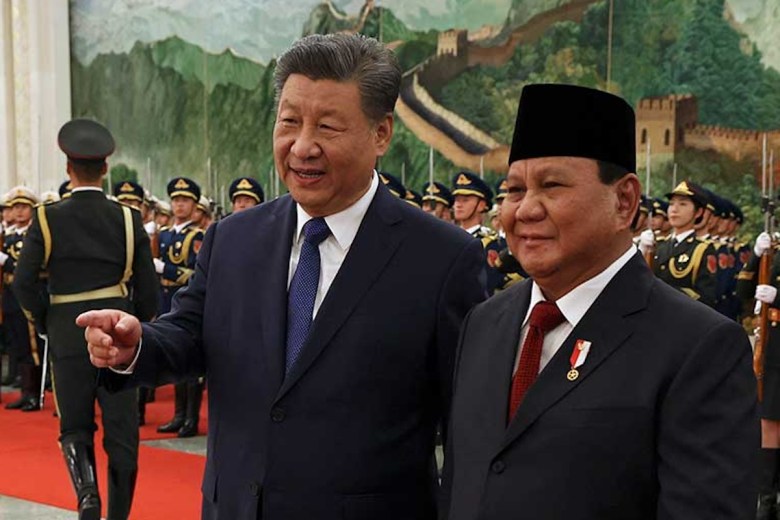Politics
Prabowo Subianto Elevates China Partnership in First Year

Prabowo Subianto has commenced his presidency with a clear focus on strengthening ties with China, positioning it as a cornerstone of his foreign and economic policy. Unlike his predecessor, Joko Widodo, who approached the partnership primarily as an economic necessity, Prabowo has integrated it into the very fabric of his leadership. His diplomatic engagements signal a shift towards a more strategic and visible relationship with Beijing.
Shortly after taking office in late 2024, Prabowo made China his first international destination. He described the nation as “a civilization that seeks harmony and common good,” and signed a joint maritime statement emphasizing “joint development in overlapping areas.” This phrase has raised concerns among some Indonesian legal experts, who argue that it contradicts Jakarta’s rejection of China’s contentious “nine-dash line” claim, which encompasses significant portions of the South China Sea. While Jokowi maintained a separation between economic cooperation and sovereignty issues, Prabowo has blurred these lines.
Following his visit to Beijing, Prabowo traveled to Washington, reiterating Indonesia’s commitment to collaborate globally while defending its sovereignty. His tone, however, marked a departure from previous administrations, conveying a stronger stance. In China, he secured investment pledges exceeding US$10 billion aimed at industrial zones, infrastructure, and education. Additionally, Beijing has committed to support Indonesia’s welfare initiatives, integrating its Belt and Road Initiative (BRI) financing with local development goals.
In January 2025, Indonesia’s membership in BRICS underscored its alignment with China’s multipolar agenda and a desire for enhanced representation within the Global South. By March, Indonesia joined the BRICS’ New Development Bank (NDB), providing access to alternative funding sources. These moves are perceived by Western nations as Jakarta’s effort to assert greater autonomy in the international arena, rather than a definitive shift away from Western partnerships.
On sensitive geopolitical issues such as Xinjiang and Taiwan, Prabowo continues to maintain the noninterference policy established under Jokowi, often opting for silence rather than public commentary. His administration has preserved the separation of economic engagement from political critique. The visit of Premier Li Qiang to Jakarta in May resulted in additional agreements focusing on energy transition and logistics, further deepening economic collaboration.
Prabowo’s attendance at China’s “Victory Day” military parade in September marked a significant diplomatic gesture. As the first Indonesian leader to join this event, he aimed to project Indonesia’s role within a rising bloc of countries in the Global South, standing alongside leaders such as Xi Jinping, Vladimir Putin, and Kim Jong Un. While this decision was met with domestic criticism, perceived as a misstep during a national emergency, it exemplified the growing significance of China in Prabowo’s vision for Indonesia’s future.
In June, while G7 leaders convened in Canada, Prabowo was in St. Petersburg, publicly commending China and Russia for their “absence of double standards.” This contrasted starkly with Jokowi’s more subdued approach to international diplomacy, although both presidents shared a similar strategy of balancing relations with major powers while safeguarding Indonesia’s autonomy.
By October, cooperation with Beijing intensified. After the United States introduced a 19% tariff on Indonesian exports, China emerged as a more reliable partner. Indonesia finalized a historic US$9 billion deal to purchase Chengdu J-10C fighter jets, marking its largest defense agreement with China and a diversification away from Western military suppliers. Additionally, discussions have resumed to expand the Jakarta-Bandung high-speed railway, a key BRI-backed initiative inherited from Jokowi.
The financial instability of Jiangsu Delong, which is linked to PT Gunbuster Nickel Industry, has highlighted Indonesia’s growing dependency on Chinese investment. Domestic backlash has also emerged due to environmental violations associated with Chinese-affiliated firms in Raja Ampat. Despite these challenges, Prabowo has largely avoided confronting labor and environmental issues related to Chinese-funded projects, choosing instead to emphasize their economic contributions.
In diplomatic appointments, Prabowo’s decision to appoint Irene, a physician and Gerindra Party politician from Papua, as Indonesia’s first vice ambassador to China reflects a trend where loyalty often outweighs expertise. Critics argue that this approach risks deepening Indonesia’s alignment with Beijing, while supporters contend that both Prabowo and Jokowi have navigated the reality of China as Indonesia’s most significant economic partner.
As Prabowo’s first year concludes, his China policy appears more of an expansion rather than a fundamental shift. He has adapted Jokowi’s pragmatic approach, amplifying it with stronger rhetoric and visible actions. His participation in BRICS and the NDB, along with his presence at high-profile events, illustrates his ambition to elevate Indonesia’s status on the global stage.
The challenge ahead for Prabowo lies in ensuring that engagement with China aligns with Indonesia’s national interests, maintaining the independence that has historically characterized Indonesian diplomacy. Balancing this ambition with the realities of international relations will be critical to sustaining his leadership legacy.
-

 Business5 months ago
Business5 months agoKenvue Dismisses CEO Thibaut Mongon as Strategic Review Advances
-

 Lifestyle4 months ago
Lifestyle4 months agoHumanism Camp Engages 250 Youths in Summer Fest 2025
-

 Sports4 months ago
Sports4 months agoDe Minaur Triumphs at Washington Open After Thrilling Comeback
-

 Sports5 months ago
Sports5 months agoTupou and Daugunu Join First Nations Squad for Lions Clash
-

 Top Stories5 months ago
Top Stories5 months agoColombian Senator Miguel Uribe Shows Signs of Recovery After Attack
-

 World5 months ago
World5 months agoASEAN Gears Up for Historic Joint Meeting of Foreign and Economic Ministers
-

 Health4 months ago
Health4 months agoNew Study Challenges Assumptions About Aging and Inflammation
-

 Business5 months ago
Business5 months agoOil Prices Surge Following New EU Sanctions on Russia
-

 Entertainment4 months ago
Entertainment4 months agoDetaşe-Sabah Violin Ensemble Captivates at Gabala Music Festival
-

 Entertainment4 months ago
Entertainment4 months agoBaku Metro Extends Hours for Justin Timberlake Concert
-

 Top Stories5 months ago
Top Stories5 months agoRethinking Singapore’s F&B Regulations Amid Business Closures
-

 Business5 months ago
Business5 months agoU.S. House Approves Stablecoin Bill, Sends to Trump for Signature









